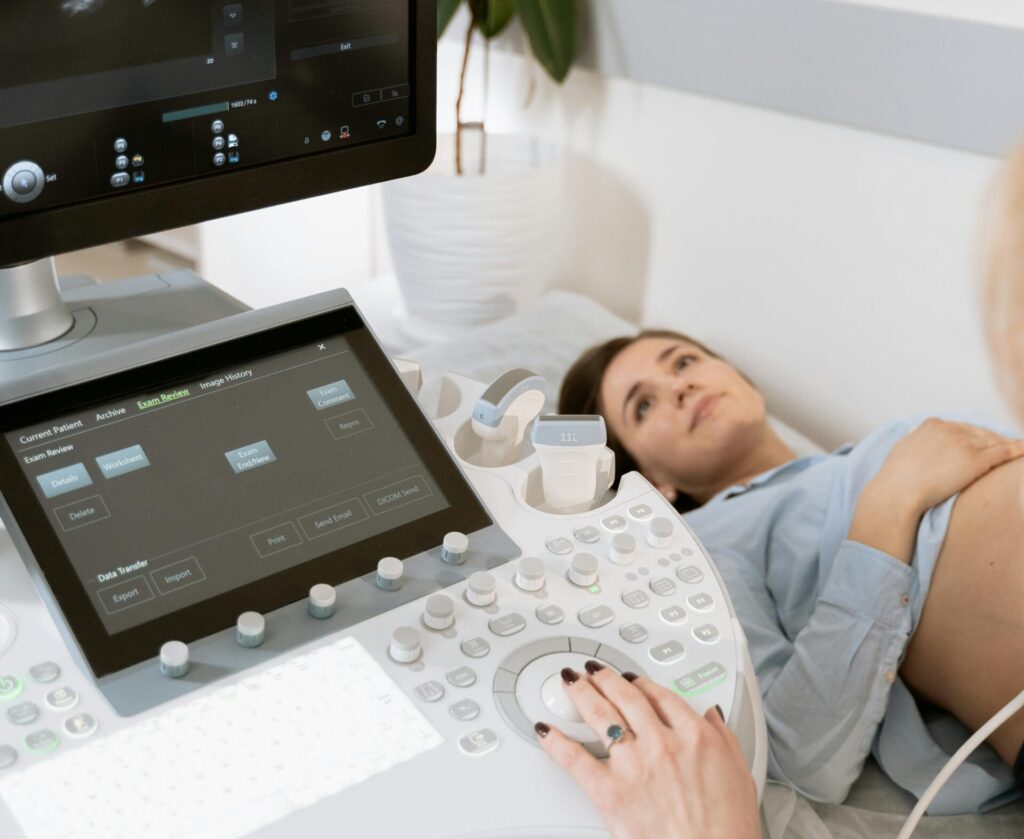Accessibility:
For another, unlisted language, please head to https://translate.google.co.uk/
On this page:
- What is induction of labour
- Why you might be induced
- If you’re overdue
- If your waters break early
- If you have a health condition or your baby is not thriving
- There are four different types of induction methods
- How long will my induction take?
- What are the risks involved?
- What induced labour feels like
- What pain relief can I have?
- If induction of labour does not work
- What if I choose not to be induced?
- What do I do on the day of my induction?
- Visiting times
- The BRAIN tool
- Busting the myths
- Vaginal birth after caesarean
- Useful contact numbers
What is induction of labour
During pregnancy, your baby is surrounded by a fluid-filled membrane (sac) which offers protection while your baby is developing in the uterus (womb). The fluid inside the membrane is called amniotic fluid (your waters).Towards the end of your pregnancy, the cervix (neck of the womb) softens and shortens. This is sometimes called “ripening of the cervix”.
Before, during, and in some rare cases after labour, the membranes rupture (break). This is often known as “your waters breaking”.During labour, your cervix dilates (opens) and the uterus contracts to push your baby out.
Labour is a natural process that can start on its own between 37 and 41 weeks into the pregnancy, leading to the birth of your baby.
Induction of labour is a process designed to help start labour. Induction of labour will be discussed with you by your midwife or doctor, if it is considered by them to be the safest option for the health of you and your baby.
When induction of labour is being discussed with you by your doctor or midwife, they will discuss your options with you before you make a decision. You will then be given time to think about and discuss with your birth partners.
If you are happy to proceed, you will be offered a date and hospital site for induction. There will also be an opportunity at this point to ask any further questions you or your partner may have.

Why you might be induced
The most common reasons for induction of labour are:
- To avoid pregnancy lasting longer than 42 weeks (known as post-dates).
- If your waters break but your labour does not start within 24 hours.
If there are other indications when your doctor thinks starting labour early is safer for you or your baby, these would be discussed with you and your birth partner.
Even if you have had a healthy, trouble-free pregnancy, you will be offered induction between 41 and 42 weeks, which you can decline. This is in line with The National Institute for Health and Care Excellence (NICE) Guidelines and World Health Organisation (WHO) recommendations. It is also based on research evidence that induction at or beyond term (40 weeks) leads to better outcomes for babies.
The risks associated with a pregnancy continuing beyond 41+0 weeks include increased likelihood of:
- Caesarean birth
- The baby needing admission to Special Care Baby Unit (SCBU)
- Stillbirth and neonatal death.
Inducing labour from 41+0 weeks may reduce these risks but may also impact a birth experience. Your midwife will support you in your decision-making, using the BRAIN tool to help guide an informed conversation. You will find this tool at the back of this booklet along with some QR codes to take you to the relevant guidance from NICE and NHS England.
If you’re overdue
Induction will be offered if you do not labour naturally by 41 weeks, as there can be a slightly higher risk of stillbirth and admissions to the neonatal unit after this time.
If your waters break early
If your waters break more than 24 hours before labour starts, there’s an increased risk of infection to you and your baby.
If your waters break after 34 weeks, you’ll have the choice of induction or expectant management.
Expectant management is when your healthcare professionals monitor your condition and your baby’s wellbeing, and your pregnancy can progress naturally as long as it’s safe for both of you.
Your midwife or doctor will discuss your options with you before you make a decision.
They should also discuss with you neonatal special care facilities in the area if you choose to be induced as your baby will be born earlier than 37 weeks and may be vulnerable to problems related to being premature.
If your waters break before 34 weeks, you’ll only be offered induction if there are other factors that suggest it’s the best thing for you and your baby.

If you have a health condition or your baby is not thriving
If this is the case, your doctor and midwife will explain your options to you so you can decide whether or not to have your labour induced.
You may be offered/advised an induction if you have a condition caused by pregnancy that means it will be safer to have your baby delivered a little sooner than 40 weeks, such as diabetes, high blood pressure, or intrahepatic cholestasis of pregnancy or there are concerns with your baby’s growth on ultrasound scan.

There are four different types of induction methods
Your midwife will offer you the option of having a membrane sweep at 39 weeks. It is your choice whether to have this procedure or not.
1) A membrane sweep is an internal examination in which the midwife gently places a gloved finger inside your cervix and makes a sweeping circular motion to separate the membranes from the cervix. There is evidence that this can help release natural labour hormones for some women. Membrane sweeping is a safe procedure and does not increase the risk of infection or your waters breaking before labour. You may experience some contractions and/or slight mucus or blood-stained loss from the vagina for 24 hours after the sweep, this is referred to as a “show” and will not cause harm to you or your baby. It is essential to inform Triage immediately if severe pain or bleeding occurs after a sweep. Labour may start naturally within a couple of days of the sweep, but if not, your midwife may discuss repeating it.
2) Cervical Ripening Balloon Catheter – this is a non-drug method and therefore you may be able to go home after the catheter has been inserted dependent on your reason for induction and that all was well on your admission.
3) Prostaglandin preparations help your cervix to soften, thin, and open up. There are two different types of prostaglandin methods; your consultant will recommend the appropriate method. These will be done as an in-patient (you will remain in the hospital throughout the induction process).
4) Breaking the waters (called Artificial Rupture of Membranes or ARM).
You may need just one or all of these methods.
An outpatient induction of labour:
- Reduces the amount of time you will need to stay in hospital before your labour begins.
- Allows you to stay at home which evidence has shown helps labour to progress as you are in a familiar place.
- Makes the process of induction as close as possible to going into labour naturally. Your midwife or doctor will assess if you are suitable for outpatient induction of labour and discuss this with you.
Below are a list of the potential methods of induction with more information:
- Membrane sweep
- Cervical Ripening Balloon Catheter (Mechanical Method)
- Prostaglandin
- Artificial Rupture of Membranes (ARM)
Membrane sweep
A sweep is performed to help promote labour. A membrane sweep is where the midwife places a gloved finger just inside your cervix (neck of the womb) and makes a sweeping circular motion to separate the membranes (sac around the baby) from the cervix. It is your choice whether to have this procedure.
There is evidence that this can start natural labour hormones. Labour may start naturally within a couple of days of the sweep, but if not, your midwife may discuss repeating it.
You may also experience some contractions or spotting (a very small amount of blood loss) in the 24 hours after the sweep. If you have any concerns, please call your local maternity unit. Membrane sweeps are not associated with increased rates of infection or an increased likelihood of your waters breaking before labour begins. They do not cause any harm to your baby.
Important – the above film has been created by colleagues at Barking, Havering and Redbridge University Hospitals – please disregard the numbers contained within as they do not relate to DBTH. All numbers for our services can be viewed here: https://www.dbth.nhs.uk/services/maternity/
Cervical Ripening Balloon Catheter (Mechanical Method)
This involves a catheter (a soft silicone tube) being inserted into your cervix. It has two balloons near the tip and when it is in place the balloons are filled with a sterile saline (salt water) fluid.
This can be used as an outpatient method which means that depending on the reason for induction of labour you may not need to stay in hospital after this is inserted. The catheter stays in place for up to 12 hours, with the balloon putting constant gentle pressure on your cervix.
The pressure should help your cervix to soften and open to enable your waters to be broken. The balloon catheter may fall out by itself or will be removed by the midwife at 12 hours.
Things you need to know:
- There is a very small risk of infection.
- Discomfort during and after insertion (common but usually mild and short-lasting)
- Bleeding (usually mild)
- Spontaneous rupture of membranes
- Failure to dilate (open) the cervix
What happens after a cervical ripening balloon catheter is inserted? You will be asked to return to hospital for an assessment 12 hours following insertion of balloon catheter.
During this time you are at home, you can do things as you would normally, for example, showering, bathing or walking. However, please avoid intercourse. It is important to change your underwear (or pad) regularly and to wash your hands before and after going to the toilet, and to make sure the catheter is clean.
It is important to contact the hospital if you have any of the following (Triage: 01302 642711)
- Vaginal bleeding (more than a mucoid show)
- Pain/Contractions
- Concerns about baby’s movements
- You feel unwell
- The waters around the baby break
- The balloon catheter falls out.
If it is not possible to break your waters following removal of the balloon catheter, we will discuss with you the option of using Prostaglandin.
Important – the above film has been created by colleagues at University Hospitals Bristol and Weston NHS Foundation Trust – please disregard any numbers contained within as they do not relate to DBTH. All numbers for our services can be viewed here: https://www.dbth.nhs.uk/services/maternity/
Prostaglandin
Prostaglandin is a hormone that is naturally produced by the body. We use two methods to deliver an artificial version of prostaglandin.
Propess: This is a pessary that looks like a very small tampon and is inserted into the vagina. This releases the hormone slowly over 24 hours to ripen your cervix. There is a string attached to the pessary to allow easy removal. The string will be placed inside your vagina.
Before Propess is given, your baby will be monitored on a CTG machine and again once the Propess has been inserted. After this you can walk around and mobilize as much as you want. It will remain in place for 24hrs and we will advise your baby be monitored on a CTG every 6 hours or more frequently if indicated. In the unlikely event the pessary should fall out, please notify the midwife immediately, as it may need reinserting.
If labour should start, the Propess will be removed when the cervix is at least 3cm dilated, by gently pulling the string.
Prostin: This is a vaginal tablet which is used as an alternative to Propess or after removal of Propess when it is not possible to break the waters. Prostin is inserted during an internal examination.
Approximately six hours later your cervix will be assessed again. If it is not able to break your waters you may require another Prostin tablet and will be reviewed by a doctor.
Things to know:
- Prostaglandin sometimes causes vaginal soreness.
- A small number of women experience some reactions such as nausea (feeling sick), vomiting or diarrhoea.
- Very occasionally, prostaglandin can cause the uterus (womb) to contract too much. If this happens, you may be given medication to relax the uterus.
- Most women will need further help to go into labour.
Important – the above film has been created by colleagues at University Hospitals Bristol and Weston NHS Foundation Trust – please disregard any numbers contained within as they do not relate to DBTH. All numbers for our services can be viewed here: https://www.dbth.nhs.uk/services/maternity/
Artificial Rupture of Membranes (ARM)
ARM (breaking your waters) can be performed if the cervix has started to dilate (open). The midwife will use a long, sterile instrument to make a small hole in the bag of fluid around your baby during a vaginal examination. This can be uncomfortable and pain relief will be discussed prior.
If your cervix is already open enough when you go in to be induced, you will be offered this method first. However, if this is not possible you will require the mechanical and/or hormonal methods first.
After you have had an ARM, your midwife will observe you and your baby’s heart rate for approximately 30 to 60 minutes.
If your contractions do not start after an ARM, you will be offered the hormone drip which is made of synthetic Oxytocin, this is a man-made version of the hormone the body naturally makes in labour. You can choose whether to have this infusion, or delay starting this, but it may mean your labour takes longer and there may be an increased risk of infection to the baby. You will be supported to discuss your preference.
Things to know:
- The vaginal examination may cause you some discomfort.
- Although ARM is usually straightforward, it can increase the risk of cord prolapse (this is where the cord falls in front of the baby’s head and can become compressed and a Caesarean section would be required), bleeding, and infection.
Oxytocin (Syntocinon drip)
Oxytocin is the hormone that drives labour, making your contractions happen and your cervix open. Syntocinon is a synthetic (artificial) version of this hormone that the hospital uses.
It is given intravenously (via a ‘drip’) in your hand or arm.
A drip is inserted using a needle that will leave a short, small plastic tube in your vein allowing fluids and oxytocin to be given. The midwife will monitor your contractions and the amount of oxytocin you receive will be adjusted according to this.
Once the drip has started, it is advised that your baby’s heartbeat will be monitored using the CTG throughout the rest of your labour. However, this does not mean you have to lie on the bed. Your midwife will help you find the most comfortable positions for labour.
Things to know:
- You may be restricted by the wires from the CTG if a wireless monitor is not available due to activity, but you can still stand, sit on a birthing ball, lay on your side, or kneel on the bed with the monitor on.
- People have reported that the oxytocin drip is painful, so you may wish to consider pain relief options before starting the drip.
- Sometimes oxytocin can cause the uterus to contract too frequently, which may affect the pattern of your baby’s heartbeat. If this happens the drip will be slowed or stopped to reduce the number and strength of contractions. Another drug (Terbutaline) may be given to cancel the effect of oxytocin.
Important – the above film has been created by colleagues at University Hospitals Bristol and Weston NHS Foundation Trust – please disregard any numbers contained within as they do not relate to DBTH. All numbers for our services can be viewed here: https://www.dbth.nhs.uk/services/maternity/
How long will my induction take?
The length of an induction is different for every person and depends on how ready the neck of the womb is for birth (cervix). In general, it may take two to five days from the start of the IOL for your baby to be born.
Occasionally you may encounter a delay in the induction process. This usually occurs once your cervix has opened enough for your waters to be broken and so you are waiting for a bed on the delivery suite. Transfer to the delivery suite can only occur when there is both a room and a midwife available to look after you on a one-to-one basis. The order in which people are transferred to the delivery suite is based on an assessment of their whole clinical background. Unfortunately, we are unable to predict how long this delay may be, however, we aim to keep you fully informed, comfortable, and both you and your baby’s health monitored throughout your stay. If your induction is delayed, please discuss with your midwife or doctor where the most appropriate place is for you to wait as it may be possible for you to wait at home.
Please be assured we only delay induction in the interest of safety for all mothers and babies we are providing care for.
What are the risks involved?
- Over-contracting of the womb (Hyperstimulating) may occur with prostaglandins and oxytocin. This will mean 5 or more contractions in 10 minutes; you will feel as though there is no break between contractions. If this occurs Propess can be removed, or Oxytocin stopped until contractions return to a normal rate. We can also give you medication to reduce contractions if needed.
- Some women experience nausea, vomiting, or diarrhoea after the Propess or Prostin is inserted. If this occurs talk to your midwife who will discuss the options with you.
- The negative aspect of IOL is a woman’s experience of the labour process. Therefore we only recommend an induction of labour when there are clinical needs or risks.
What induced labour feels like
Induced labour is usually more painful than labour that starts on its own, pain relief options will be discussed and offered if required.
Your pain relief options during labour should not be restricted by being induced however having a water birth may be impacted due to monitoring your baby during the induction, this can be reviewed and discussed with you at the time regarding other options.
If you are induced you’ll be more likely to have an assisted delivery, where forceps or ventouse suction are used to help the baby out.

What pain relief can I have?
You will be offered emotional support from your midwife and whatever pain relief is appropriate to you – in the same way as if your labour had not been induced. You will be encouraged to use your own coping strategies for pain relief as well.
There are several options for pain relief during the initial induction stages on the ward:
- Water – has been proven to reduce pain during labour. The wards have baths available which can help you relax and will aid your body’s natural oxytocin production to help your labour progress.
- Transcutaneous electrical nerve stimulation (TENS) – you can buy or hire your own TENs machine to use in your induction. TENs uses electrical impulses to stimulate nerves at the height of your contractions which helps provide pain relief by blocking massages to the brain.
- Paracetamol – is the lightest form of medicinal pain relief offered; it can help take the edge off the early stages of labour. Please don’t take your own whilst in hospital, or if you do please let your midwife know.
- Dihydrocodeine – is an opioid medicine. It is used to treat moderate to severe types of pain. It works by binding to certain tiny areas, called opioid receptors, in your central nervous system. This leads to a decrease in the way you feel pain and your reaction to pain.
- Entonox – Also known as Gas and Air. This is pain relief you breathe in through a tube and mouthpiece. It quickly enters the body providing pain relief and helps you with deep breathing. It can make you feel dizzy, but does quickly leave your system when you stop breathing it in.
Once you are on the labour ward an Epidural and stronger pain relief injections such as Pethidine will be discussed and offered to you.
If induction of labour does not work
Induction of labour is not always successful, and labour may not start.
Your Consultant and midwife will assess your condition and your baby’s wellbeing, and you may be offered a rest and re-start the induction process or a caesarean section.
All options will be discussed with you and the decision will be yours.

What if I choose not to be induced?
If you choose not to be induced at this stage, you will be offered an appointment with a doctor who will discuss with you a personalised plan of care and your preferred mode of delivery which may be an Elective Caesarean section. This may include having regular checks of your baby’s heartbeat and you may be offered a scan to check the amount of fluid around the baby and the placenta. However, these checks can only tell us how your baby is at the time of the check.
What do I do on the day of my induction?
You will be contacted on the day of your induction by the midwives on the ward and given a time to attend.
When you are admitted for your induction we will want to check your blood pressure, pulse, temperature and urine. Your midwife will review your notes with you on arrival so you can decide together if induction is still an appropriate option for you. Your baby will be monitored prior to the induction being started.
In most cases you will start off in a 4 bedded bay with other women also having an induction. Once you are ready to have your waters broken you will be moved to a private room on the delivery suite.
We recognize that it can be frustrating to see other women leaving the bay in labour if your contractions have not started. Everyone responds differently to the IOL process and if your labour progresses more slowly, this does not mean you are doing anything wrong, it just means your body and your baby aren’t quite ready yet.
What should I bring with me?
You may be in hospital for several days during the IOL process and you may spend some time waiting. You should bring your hospital bag with you when you come (even if you are planning an outpatient induction). Things we would recommend bringing in addition to your hospital bag are:
- Your birth plan, this is still important and where possible we will always try to respect and support your wishes. A device to watch TV (Phone/laptop) A way to play music and headphones.
- Books/ magazines etc
- Pack of cards to play with your birth partner
- Pillow, eye mask and ear plugs to help you sleep
- Snacks
- Medications- please bring any regular medications you take during pregnancy with you.
- Birthing balls- we do have these but you are welcome to bring your own with you.
You will be provided with breakfast, lunch and dinner alongside water/teas and coffee whilst you are an inpatient. Any other snacks and meals for your birthing partner must be provided by yourself.

Visiting times
You can have two birth partners attend with you for your induction on the ward, however, only one can stay overnight whilst on the ward. Once you are on the delivery suite/labour ward both your birthing partners can stay with you until your baby is born.
The BRAIN tool
A tool for better conversations, it may be useful to use this tool to help you talk through your options with your birth partner.
Whilst making your decision about induction of labour you may find it useful to use the BRAIN tool below to help you ask the right questions to your midwife or doctor.
Benefits – What are the benefits of an induction of labour for you and your baby?
Risks – What are the risks of an induction of labour? Are there any specific side effects that would be personal to you?
Alternatives – What are the alternatives to an induction of labour?
Intuition – How do you feel about the idea of an induction of labour? You know your body and your baby very well and we are here to listen to you.
Nothing – What if I do nothing? You don’t have to make a decision straight away; you can take some time to decide the best course of action for you.
If you have any further questions or concerns, please speak to your midwife or contact the Lead midwife for IOL on 01302 644602 who will be happy to discuss this leaflet in more detail and answer any questions.

Busting the myths
There are lots of myths about how you can make your baby arrive quicker and start your labour naturally, but most of these are nonsense!
There is no available evidence that supports the following methods to induce labour:
- Raspberry leaf tea
- Herbal supplements
- Acupuncture
- Homeopathic methods
- Castor oil
- Hot baths
- Enemas
- Sex
Having sex will not cause harm, but you should avoid having sex if your waters have broken as there’s an increased risk of infection.
For more information on induction, you can read the NICE information for the public on induction of labour or our guide to induction of labour.

Vaginal birth after caesarean and induction
Induction of labour increases the risk of scar rupture by two or three times compared to labour which starts spontaneously but it is still rare only, occurring in one or two women in 100.
Useful contact numbers
- Specialist Midwife for IOL: 01302 644602
- Doncaster Ward M2: 01302 642705
- Triage: 01302 642711
- Central Delivery Suite: 01302 642644
- Bassetlaw Ward A2: 01909 572218
- Bassetlaw Labour Ward: 01909 502235
Patient Experience Team The team are available to help with any concerns/complaints you may have about your experience at the Trust. Contact can be made either by telephone or email.
- Telephone: 01302 642764 or 0800 028 8059
- Email: dbth.pals.dbh@nhs.net
Doncaster and Bassetlaw Maternity and Neonatal Voices Partnership are a friendly group of parents, their families and health care professionals, who work together to shape, develop and improve Maternity services in Doncaster and Bassetlaw. It is a way for mothers, fathers, and partners to share their experiences, knowledge, and skills to build developments to local maternity services.
Email us at donbassmatneovoices@gmail.com Follow us on Instagram @doncastermvp Message us on Facebook https://www.facebook.com/doncastermvp

Content out of date? Information wrong or not clear enough? Report this page.

